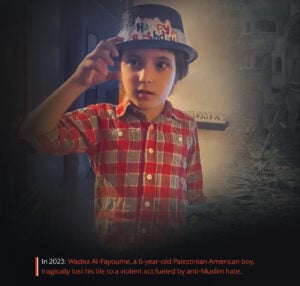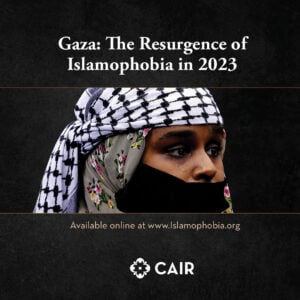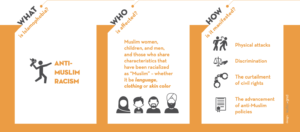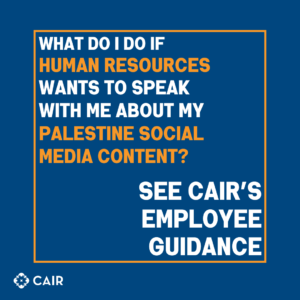Five months after President Donald Trump announced his bid for presidency in 2015, he provided the first clue to his planned offensive against an entire religious community. In a November interview with Fox News from his gilded tower in New York City, Trump announced he would have “absolutely no choice” except to shut down mosques because of the occurrence of “some really bad things.” This hinted to the domestic target of his anti-Muslim animus – Muslim institutions and civic infrastructure.
His next clue of an assault against Muslims came a month later when he called for a “complete shutdown of Muslims entering the United States.” He justified this demand for a Muslim ban by citing a defective and inaccurate Center for Security Policy poll conducted by Kellyanne Conway, now adviser to the President. The Center for Security Policy is an extremist anti-Muslim think tank founded by Frank Gaffney and a core node of the national Islamophobia Network. Gaffney is a conspiracy theorist who, among other ludicrous claims, has accused former President Barack Obama of being a secret Muslim. This connection provides just one example of the current administration’s deep links to anti-Muslim hate groups across the country.
At the moment, Trump’s Muslim Ban effectively works both on an international and domestic front. The former through the prevention of Muslims from entering the country, and the latter through wrecking and debilitating domestic Muslim organizations.
Part 1: The Immigration Executive Order
On January 28, one day after Trump signed the executive order banning all refugees and nationals of seven Muslim-majority countries from entry into the country, former New York City Mayor Rudy Giuliani admitted in an interview with Fox News that the order was originally conceived as a way to fulfill Trump’s campaign promise of a ban on Muslim entry.
“Show me the right way to do it legally,” Trump said, according to Giuliani. “And what we did was we focused on, instead of religion, danger,” Giuliani continued in his interview. “The areas of the world that create danger for us, which is a factual basis, not a religious basis. Perfectly legal, perfectly sensible.”
It is thus apparent that from the initial conceptualization to the actual assembled document, the executive order aims to target a religious group behind a façade of national security. In doing so, it both violates the First Amendment and jeopardizes the true safety and well-being of the country and its inhabitants.
Endorsing One Religion, Disfavoring Another
In a further breach of the Constitution, the day he signed the order Trump stated in an interview with the Christian Broadcasting Network that Christian refugees would be given priority in the refugee program. And indeed, the order explicitly articulates an exception for the entry of refugees who are religious minorities in the individual’s country of residence. More than that, the order commands the prioritization of refugee claims by those are a religious minority. Given that the ban itself clearly singles out countries in which Muslims are the numerical majority, and given the geographical context of the refugee crises, this in fact favors one religion and its practitioners over another.
Noting this, the Southern Poverty Law Center and American’s United for Separation of Church and State stated in an amicus, or friend of the court, brief filed in support of Washington state’s lawsuit against the ban that the executive order, “discriminates against Muslims and disfavors one religion as compared with others, and endorses one religion as compared with others.” The brief continued, stating that the order singled out Muslims for “harsh legal disabilities and punishments, including exclusion, detention, and expulsion.”
In his arguments against the ban, Noah G. Purcell, the Washington state solicitor general, likewise stated that the executive order was intended as a form of religious discrimination. Purcell said that the evidence lined up cleanly to show that the order “intended to favor some religious groups over others.”
Sweeping Pushback Against the Order
Amicus briefs filed by the attorneys general of 15 states – including California, New York Connecticut, Delaware, Illinois, Iowa, Maine, Maryland, Massachusetts, New Mexico, New York, Oregon, Pennsylvania, Rhode Island, Virginia, Vermont and the District of Columbia – in support of the state of Washington lawsuit stated that the executive order “violates the Establishment Clause of the First Amendment,” because it specifically targeted people of the Islamic faith and that it “represents an act of unconstitutional discrimination.”
Close to 100 technology companies, including Google, Apple, Microsoft, Facebook, and Twitter, over 150 law professors, and dozens of organizations such as the Jewish Federation, the American Center for Law and Justice, Americans United for Separation of Church and State, the ACLU, and the Korematsu Center similarly filed amicus briefs with the Ninth Circuit in support of Washington state’s lawsuit.
The ACLU echoed arguments found in other amicus briefs, stating that the executive order was “motivated by bias against Muslims.” In addition to its blatant religious discrimination, the brief argued that the executive order was absent “any rational justification for the categorical exclusion of individuals from the seven identified nations or the complete ban on refugees from around the world.” Thus, the brief indicated that even if the executive order were motivated by a desire for national security, it lacked the relevant facts and arguments necessary to demonstrate that concern.
Adjunct Professor of Law at Georgetown University Law Center, Carrie Cordero put forth similar thoughts on the executive order. She stated that unlike previous national security arguments advanced by the government, this executive order banning Muslim immigration was not supported by the “expert views of a senior ranking national security official” and it was devoid of detailed arguments “under oath from a senior government national security official that the required legal authority is necessary or relevant to national security.”
The administration’s defense was grounded solely in the Presidents statements that the executive order was intended to protect national security, and in doing so, it relied on the plenary power doctrine. This doctrine holds that the executive branch of government has the sole power to regulate all aspects of immigration without review. Yet as has been evidenced, the President made numerous statements illuminating how the ban was in fact intended to ban the entry of Muslims into the United States.
In its brief, the Korematsu Center put forward an eloquent argument against the plenary power doctrine. It argued that this doctrine was grounded in racist, nativist, and xenophobic justifications and was being used as such to discriminate on the basis of religion. “The plenary power doctrine, like the “separate but equal” doctrine, is a relic of an odious past that has no role in modern American jurisprudence. Just as Plessy v. Ferguson was influenced by nineteenth century views anathema today, the plenary power doctrine derives from decisions like Chae Chan Ping v. United States, (1889) (“Chinese Exclusion Case”), that stoked xenophobia.”
In the Ninth Circuit’s final, unanimous 29-page ruling on the State of Washington & State of Minnesota v. Trump against the executive order, the three judge panel recognized this fact. “The Government has pointed to no evidence that any alien from any of the countries named in the Order has perpetrated a terrorist attack in the United States,” the judges wrote. “Rather than present evidence to explain the need for the Executive Order, the Government has taken the position that we must not review its decision at all.”
Hateful and Islamophobic Roots
As is evident, the executive order was rooted in discriminatory intent and sought to prevent the entry of those who adhere to the Islamic faith. This is further exemplified by the use of code language within the text of the order itself, which draws on falsehoods and key words and phrases recycled by anti-Muslim bigots in their offensive against Islam and its practitioners. A few examples will suffice.
First, reading between the lines, the executive order draws on the false premise that Muslims specifically “bear hostile attitudes toward [the United States] and its founding principles” (Section 1). This can be evidenced in the President’s numerous Islamophobic statements, such as when he expressed in a CNN interview in March 2016 that “Islam hates us.” When he was asked to distinguish between Islam and radical Islam, Trump asserted, “you don’t know who is who.” In another instance in June 2016, Trump accused Muslims of “trying to take over our children and convince them how wonderful ISIS is and how wonderful Islam is.”
Another example of how the rhetoric of the anti-Muslim industry infuses the document is the use of phrases such as, “honor killings,” “violent ideologies over American Law,” and “persecution of those who practice religions different from their own.” These are wholly constructions formed and disseminated by those who possess a close-minded prejudice against Muslims.
What Lies Ahead
Though a stay has been placed on the current incarnation of the immigration ban, the meticulous Ninth Circuit ruling is preliminary. It is not the final fate of the ban and strong legislative pushback is necessary to ensure its final demise. Already there are rumors that a new executive order is being drafted for the same purpose of banning Muslim entry. A redrafted executive order is likely to contain no facially discriminatory text which targets religion at the risk of running into the same issues the original order did. However, like the effects of facially neutral voting laws intended to discriminate against Black Americans in the mid-twentieth century, the discriminatory intent behind a legally viable redrafted ban will remain the same, as will the effect. Senior White House Policy Adviser Stephen Miller said as much in a February 21 Fox News interview when he claimed that the revised version would “have the same basic policy outcome.”
Part 2: The Designation of the Muslim Brotherhood as a Terrorist Organization
This piece of the Trump administration’s evolving Muslim Ban is as toxic, if not more so, than the first. The impending executive order, which would direct the Secretary of State to determine whether to designate the Muslim Brotherhood a foreign terrorist organization, is a clear and simple witch hunt, neo-McCarthyism in the age of Trump. It has the potential to dismember and debilitate the existing civic and political Muslim infrastructure in the United States through a macabre employment of “six degrees of separation.”
The potential designation is similar to the immigration order in that it hides religious animus behind the veil of national security. It is also similar in that it draws its inspiration directly from the prejudiced rhetoric of the Islamophobia Network in the United States. Such a designation has been the shrill cry of the Islamophobia Network for years, which has worked to smear American Muslim civil rights organizations and labelled them “fronts” of the Muslim Brotherhood.
The Abhorrent Aims of the Anti-Muslim Network
In an email sent by ACT for America president Brigitte Gabriel to the group’s supporters on December 13, 2016, Gabriel gloated about her connections within the incoming administration. ACT is an extremist anti-Muslim hate group whose primary purpose is to demonize and vilify Islam and its practitioners. Two of its board members joined the Trump campaign as national security advisers. One of them is the resigned National Security Adviser Michael Flynn who called Islam “a cancer” at an ACT event in Dallas in August 2016.
In her celebratory email, Gabriel emphatically stated that her priority for the Trump administration would be to ensure the designation of the Muslim Brotherhood as a terrorist organization. Acting in unison with ACT, Frank Gaffney of the Center for Security Policy crowed in a Breitbart radio interview mere hours after Trump’s election that it would now be “stopping, designating, rolling up the Muslim Brotherhood in America as the terrorist organization it is.” A week later, Sen. Ted Cruz introduced legislation that would require the Secretary of State to report to Congress on “‘whether the Muslim Brotherhood meets the criteria for designation as a foreign terrorist organization’ and, if not, would include ‘a detailed justification as to which criteria have not been met.’”
It is meaningful to note that the original draft of Cruz’s bill was written by John Guandolo, a disgraced former FBI agent who founded Understanding the Threat, a core organization of the Islamophobia Network. It claims to offer guidance and training to law enforcement officials on the “Global Islamic Movement and the jihadi networks.” Like Gaffney at CSP, Guandolo is a patent conspiracy theorist. He claimed in 2015 that then CIA Director John Brennan was a secret Muslim agent for a foreign power. He also alleged that President Obama may be committing “treason” by working with U.S. Muslim groups to oppose violent extremism because all the groups “share the same ideology as ISIS.”
Additionally, and more pointedly, in his training materials, Guandolo refers to America’s mosques and Islamic centers as “barracks.” In 2012, Guandolo falsely claimed that mosques were fronts for the Muslim Brotherhood with no right to exist. He continued to state, “They do not have a First Amendment right to do anything.” Last year he stated that the U.S. should arrest “all of the Muslim Brotherhood leaders in the U.S., shutting down their organizations and all Muslim Brotherhood mosques, which is 80% of them.”
This demonstrates how from its very origin, the drive to designate the Muslim Brotherhood as a terrorist organization is grounded, not in the defense of national security, but in anti-Muslim prejudice, a well-financed anti-Muslim industry, and bizarre conspiracy theories.
The conspiracy theory most often cited by bigots is that the Muslim Brotherhood controls American Muslim organizations. This is based in a thoroughly discredited memorandum written in 1991 by a lone man who sketched out his delusional vision for Islam in America. Other than a single copy brought forth during the 2008 Holy Land Foundation trial, no print is known to exist. An investigative New Yorker piece states that, examined closely, the memo “does not stand up as an authoritative prescription for action. Rather, it appears to have been written as a plea…for action, by an author we know little about.” Similarly, after an exhaustive research process, scholars at Georgetown university concluded that the memo was of “inconsequential nature” for Muslims and Islamic organizations around the world.
The (De)Merits of the Designation
A plethora of scholars and foreign policy and national security experts have stridently questioned the merits of a terrorist designation for the Muslim Brotherhood. In the Atlantic, Brookings Senior Fellow Shadi Hamid states that “not a single American expert on the Muslim Brotherhood” supports designation. He continues to note that irrespective of the debate on the Brotherhood’s nature as a morally sound organization, it is irrelevant to “whether or not it is a terrorist organization. Being a terrorist organization involves, among other things, ordering your members to commit terrorist attacks, something no one argues the Egyptian Muslim Brotherhood is doing.”
Daniel Benjamin, the former State Department’s coordinator for counterterrorism under Secretary of State Hillary Clinton, expressed similar sentiments in a Politico piece. “I think it would be an incredibly stupid thing to do” he said regarding the designation. “The top reason being that it’s not a terrorist group.”
If, as is argued by academics and policy experts across the political spectrum, the Muslim Brotherhood is not a terrorist organization, it begs the question of what the pursuit of such a designation would achieve. The answer to this goes back, again, to the anti-Muslim prejudice which drives the motives of those advocating for it.
The Designation’s Ideological Underpinnings
One of the leading advocates within the White House of the terrorist designation is Steve Bannon, former executive chair of Breitbart News, a “crusading right-wing populist website” and current chief strategist to the president. Bannon possesses close ties to Gaffney, whose anti-Muslim animosity has been illustrated earlier. Mirroring Guandolo and Gaffney, Bannon also engages in peddling conspiracy theories. In a film summary produced by Bannon, the Muslim Brotherhood was described as “the foundation of modern terrorism,” and “enablers” of radical Islam included the New York Times, the Washington Post, the “American Jewish community,” and the State Department. Bannon also used Breitbart to accuse Huma Abedin, the top aide of former Secretary of State Hillary Clinton, of being “secretly connected” with the Muslim Brotherhood
The Editorial Board of the New York Times has observed that the terrorist designation is “part of a mission by the president and his closest advisers to heighten fears by promoting a dangerously exaggerated vision of an America under siege by what they call radical Islam.”
Fundamentally, the argument advanced by Bannon, Trump, Gaffney, and their ilk is ideological. As Benjamin Wittes argues on Lawfare, the designation is part of a “larger enthusiasm” for a “civilizational battle against ‘radical Islam.’” Hamid concurs, stating that the Trump administration blithely employs the “narrative of a clash of civilizations. This clash pits the West, and more specifically Judeo-Christian civilization, against “radical Islam,” an amorphous concept which seems to, at least potentially, include not just extremists, but Islamists more broadly, and not just Islamists, but Muslims more broadly.” For example, in his inaugural address, Trump called to “unite the civilized world against radical Islamic terrorism, which we will eradicate completely from the face of the earth.”
The Potential Ramifications of the Witch Hunt
It is evident that the looming designation is a witch hunt, with the underlying goal of eviscerating American Muslim civil society and leadership through the fabrication of contrived guilt by association. It has the potential to criminalize any Muslim engaged in, or even marginally associated with, the exercise of Muslim civil and political rights. This could extend to community centers, relief providers, mosques, and any number of Muslim civil activities. It plays perfectly into the hands of far-right Neo-Nazi populists who seek to, as Rafia Zakaria says, “make all Muslims terrorists – not through insinuation but actually label them as such.”
Through the overbroad use of the material support statue, section 2339 of the Patriot Act, the Muslim Brotherhood terrorist designation could result in unfounded government targeting of American Muslim entities alleged as either designated or related to designated entities. In other words, it would allow the government to attack any American Muslim organization it wants, without evidence or support, based on religious prejudice. Unfortunately, this is not an unrealistic possibility, however terrifying it may be, in light of Trump’s promise to shut down mosques, and supporting statements by members of his administration.
The Human Rights Watch states that the United States has a history of using material support charges in an overbroad manner, “punishing behavior that did not demonstrate an intent to support terrorism.” Among other effects, such prosecutions “violate individuals’ rights to free expression and association.”
Thus, the terrorist designation could freeze American Muslim organizations in lawful action and speech, including the freedom of worship and association, for fear of incrimination. It has the potential to destroy the reputations of American Muslims through broad brushed accusations from government officials. A coalition statement drafted by the Brennan Center states that “a designation could also result in unconstitutional asset seizures and effective shut-downs of civil society and rights groups.”
It is important to remember that American Muslim organizations have already been thoroughly scrutinized under both the Bush and Obama administrations. Were there anything suspect, they would not be flourishing in American soil today. American Muslim organizations are a vibrant and essential part of the American fabric. Choking the religious and political freedom of the American Muslim community is a threat to the democratic ideals of this country.
Trump is well on his way to fulfilling promises he made on his campaign trail. His evolving Muslim Ban, which includes barring Muslim entry and preparing to cripple Muslim civic infrastructure, has been foremost on his list. Trump enthusiastically promised in his inaugural address, that “the forgotten men and women of our country will be forgotten no longer.” Will he make true on this promise too and remember the demonized and scapegoated Muslim women and men?





